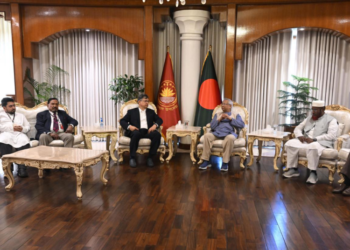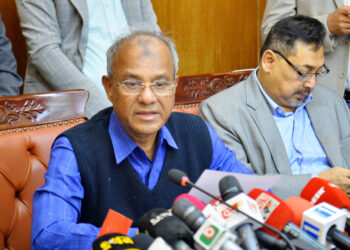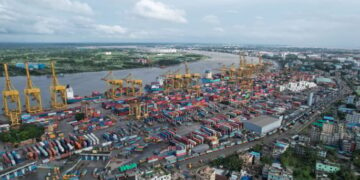Introduction
The world has faces many humanitarian crisis last few decades, one of the most heart-wrenching crisis in Southeast Asia was “The plight of the Rohingya People”. Their main Homeland is Myanmar but thousands of Rohingya refugees take shelter in Bangladesh which creates many challenges for this country. It effected Bangladesh’s economy, social, environment, health and also politics.
Rohingya people experienced ethic and religious in Myanmar. Many Rohingya lives in Other countries in South Asian such as Malaysia, Indonesia, Philippines and in Bangladesh who came from Rakhine State. In Bangladesh, officially two refugee camps located in Ukhiya and Teknaf which is located in Cox’s Bazar District. Based on the report of UNHCR( UN Refugee Agency),since 25 August 2017 more than 723,000 Rohingya fled to Bangladesh.
History of Rohingyas
The Rohingya past is a complex and very much disputed one, marked by decades of coexistence, growing tension, and abject suffering. The following is an account of their past, with the aim of brevity and compassion:
Early Origins and Settlement
A Region of Convergence
Rohingya’s historical background started from Rakhine State which is a region in South and Southeast Asia. Geographically it located to influences from both the Indian Subcontinent and also mainland Southeast Asia. From their history,we get the proof that how Muslim communities exist in the area for centuries.
There are records of Muslim colonies and interactions in the Arakan kingdom, which for a very long time remained isolated from Burman kingdoms.
Varied Historical Descriptions
The Rohingya’s precise origin is disputed. An ancient indigenous presence is mentioned by some researchers, but others point to migrations in more recent periods from adjacent Bengal.
Arakanese Kingdoms
The Arakan region was home to several unique kingdoms, each of which had a variety of populations, including Muslim communities. That times as well as different of comparatively High levels for integration and tolerance. Many Indiana Subcontinent works such as Bengal who are migrated in high numbers of Rakhine State ,in the era of British colonial in Burma. The term “Rohingya” has historical legitimacy because it was used by the British themselves in documents.
Denial of Citizenship after Independence
Burmese Independence and Increasing Tensions, the Rohingya were subjected to growing exclusion and discrimination following Burma’s 1948 independence. Government of Burmese deny them to give full citizenship and declined them as “Illegal immigrants” whom came from Bangladesh.
1982 Citizenship Law
The 1982 citizenship law is a pivotal moment of the enactment and it effectively rendered Rohingya stateless. This system of citizenship created many excluded from the list of recognized ethnic people.
Escalating Persecution
Systematic persecution, the Rohingya have been subjected over the decades, such as restrictions on freedom of movement, on Education, also in healthcare.
Why Rohingyas come Bangladesh
As Rohingya crisis is an intricate and teeming, Bangladesh fully support them and give them the place for saving own life. They provide all necessary things which they need for living.
The imperative of Repatriation
Desire for Home
Rohingya refugees living very crowded camps in Bangladesh. They have unlimited desire to return homeland in Rakhine State, Myanmar. That is rooted in a deep sense of belonging, connected to ancestral lands and also desire to rebuild their lives and communities.
Bangladesh’s Stance
Repatriation is the most sustainable long-term solution to the crisis which is consistently by government of Bangladesh. Such a large refugee population and seeks a dignified and safe return for the Rohingya.
International consensus
International sectors broadly agrees that voluntary, safety and dignified repatriation that is the ideal outcome. Achieving this goal, the root causes of the crisis and creating condition conducive to return.
The Obstacles to Repatriation
Condition in Rakhine State
The lack of safe and secure condition in Rakhine State is the primary obstacle to repatriation. If they return may faces violence and discrimination which given by the history.
Lack of trust and Guarantees
Rohingya haven’t any trust on Myanmar government because of they responsible for the violence and discrimination. They want citizenship, security and freedom of movement which is a basic need as an citizen.
Logical challenges and international inaction
Logical challenges, including a large population are immense, ensuring safe passage, provide adequate housing and also restoring livelihoods. On the other hand, international community has struggled to give a shape and hand this situation. Still now they are working on it.
Bangladesh’s Humanitarian Response
•A Flood of Humanity
2017 exodus was staggering within a week, thousands of Rohingya refugees across the border into Bangladesh from Myanmar. All of this sudden situation and massive influx created an immediate humanitarian emergency and already limited resources of the Cox’s Bazar.
•Open Borders and Initial Aid
Bangladesh chose to open it’s borders to providing refugee to these persecution. It also placed an immense burden on the country to act humanity was widely. All emergency efforts was launched with the government organization, international organizations and also local communities who work together for them by providing food, shelter and medical care.
•For building Humanitarian Infrastructure
Creating camps
By transforming the landscape of Cox’s Bazar, they establishment of sprawling refugee camps become a necessity. They all give efforts for creating some semblance of order and give necessary services with these rapidly growth settlement.

Providing Essential Services
By providing many essential elements including food, clean water, sanitation, hygiene facilities. Also healthcare services such as emergency medical care, shelter and protection for vulnerable populations.
•International support
Not only Asian countries but also European countries including United State, Canada, Australia, Japan. They provides several stuffs for cure. Rohingya crisis is not just a humanity challenge also it’s a moral imperative. This world should not be turn a blind eye to the suffering of these people.
Read More: Cybersecurity: How to Stay Safe in a World That’s Always Online
Impact on Bangladesh’s Economy
Bangladesh’s economy has faced economic tensions from the influx of Rohingya refugees. The arrival of hundreds of thousands of Rohingya refugees into Bangladesh, most recently due to the outbreak of large-scale violence in Myanmar in August 2017, has placed a staggering economic burden on the country. The burden impacts the host populations in a variety of ways, as well as the economy of the country in totality.
•High Cost of Living
One of its direct and tangible impacts has been rising cost of living, especially in the host locations of the refugee camps, i.e., in Cox’s Bazar. The immediate surge in numbers has caused higher demand for staple items as well as services, i.e., food items, sheltering material, and daily essentials. This higher demand, supported by prevailing supply limitations, has resulted in higher prices, reaching the refugees as well as the host populations. For instance, evidence shows prices of daily essentials in the hit locations went up quite substantially after the large influx in 2017. The staple food, rice, experienced a large price hike.
•Strain on Resource Base
It takes an enormous amount of resources to host close to a million refugees. It strains the already overloaded resources of Bangladesh to provide the bare essentials of food, water, sanitation, and health care. The setup and maintenance of the refugee camps also take up land, which by itself can affect the surrounding farm production and livelihood. In addition, the arrival of the refugees has also destroyed the pre-existing infrastructure, roads, as well as water pipes, which would take enormous investment in repair and upgradation. Experts estimate the damage in terms of road infrastructure alone in terms of millions of US dollars in the first few years.
•Impact on Employment and Wages
The influx of a large group of working refugees has also impacted the labor market within the host community. Rohingya refugees, who are in some cases even ready to work at reduced salaries, introduced competition for the host community’s daily wage workers, resulting in a decrease in the wage price. This impacted negatively on the livelihood and income of the host community workers, and it has made some families poorer. Evidence in the early phase of the crisis showed a considerable drop in the daily average wages in the host community’s surrounding regions.
•Environmental Degradation
The economic impact of the refugee influx is also immense. The urgent needs of housing and firewood have also caused large sections of forests and cover vegetation to be uprooted, leading to deforestation and land loss. Environmental degradation does not only affect the immediate environment but also the livelihood of forest-resource-dependent people. The loss of forest reserves has been estimated in terms of hundreds of millions of US dollars.
•Burden on National Exchequer
The Rohingya refugee crisis has placed a tremendous burden on the country’s national exchequer. Though foreign assistance has been generous, Bangladesh is incurring a tremendous expense, both in terms of security, administration, as also in terms of services. The government has also invested in ventures like the development of Bhasan Char, a temporary resettlement island for a segment of the refugee, at a tremendous expense. International donors also contributed generously, but in recent years, there has been a disquieting trend towards decreasing contributor donation, with the fear of a larger burden for Bangladesh.
•Impact On Tourism
The economic burden of the crisis has also hit the tourist area in Cox’s Bazar. The influx of large refugee camps has deterred would-be visitors, and thus, there are declining reservations in hotels and resultant business. The loss of tourist revenue has also strained the economy further.
•Possible Reduction in Economic Burden through Rohingya Repatriation
The repatriation of some, if not, of the Rohingya back into Bangladesh, while a complex and challenging one, would be able to ease some of Bangladesh’s economic burden. How many are repatriated, let alone whether or not it is a permanent repatriation, is yet to be seen.
•Reduced Pressure on Resources
We would ensure that the refugee numbers are minimized, thus the demand for food, water, sanitation, and health services in the camps would be minimized. This would free up resources, which could be reallocated towards other development needs of Bangladesh.
•Relieving Infrastructural Pressure
Since there would be a reduced number of refugees, infrastructural pressure in the host regions would also be reduced. This would decrease the frequency of maintenance costs and facilitate the planning and infrastructural development of the locals.
•Improved Labor Market Conditions
The return of a large number of Rohingya would ease the burden in the domestic labor market. Since there would be a reduced supply of low-cost labor, there might be a rise in the daily laborers’ remuneration, improving their economic conditions.
•Environmental Reconstitution
If the abandoned territory of the refugees is not used, not much environment reconstruction can occur. Reconstitution of forests and reduced pressure on nature can yield long-range environmental as well as economic gains.
•Lower National Budget Strain
The lower number of refugees would definitely decrease the amount of financial strain put on the country’s national budget for refugee maintenance. Such funds would be used in vital sectors such as health, education, and infrastructural development within the country.
•Revival of Tourism
Once host places, notably Cox’s Bazaar, return to normalcy, the tourist industry can get a boost. Reduction in refugees and the related issues can make the destination more attractive for visitors, hence helping the host economy while also generating employment.
The repatriation process itself, however, would have economic implications. The transportation and upkeep of the returnees themselves, as well as the support in their rehabilitation, would cost. The timing, and even the degree, of repatriation would also be unpredictable, subject to a variety of political and security variables in Myanmar.
•Current Status and Repatriation Process
The status up to date in April 2025 is complex. Bangladesh has been attempting to repatriate the Rohingya, but there has not been any quick progress due to a variety of factors, including the political outlook in Myanmar as well as the protection and security issue of the returnee refugees. There has been reporting in recent months that Myanmar has cleared a batch of Rohingya for return, but the process and time are unclear. Impact of Partial Repatriation: If repatriated are a small number of Rohingyas, economic relief in Bangladesh might not be substantial. The underlying causes of strains in resources, infrastructural pressure, labor market strain, and environmental deterioration would mostly persist. For a real impact in the Bangladesh economy, a large repatriation through a sustained process would be required. The Rohingya refugee crisis has put a substantial economic burden in Bangladesh on the cost of living, resources, infrastructure, employment, environment, and budget of the country. Even if the return of refugees can reverse part of these strains, the extent of reversal would depend upon the size and nature of the return, if ever, that would occur. Considering the complexities of the current situation and the large numbers of refugees who are still in Bangladesh, the economic burdens are immediate in the short term. The active engagement of the international community, together with major advances in ensuring repatriation as safe and dignified, would be instrumental in alleviating Bangladesh’s long-time economic burden.
Impact on Social
•Host Community and security Concerns
Bangladesh has shown immense compassion, prolonged presence of a large number of refuge which inevitably created tensions within host communities. They all concern about resource competition, land use, and also changing the local environment. They created large, displaced population which creates security challenges including increasing crime, trafficking and influence of extremist groups which have been raised.
•Cultural difference and impact on society services
Every country, society have their own culture and traditions. Their culture is different from ours and their promoting integration has been a decline balancing act. Requiring careful efforts to foster mutual understanding and respect. It effected on local social services including healthcare and education.
Read More: Impacts of the RMG sector on Bangladesh’s Economy
Impact on Education
Rohingya refugees crisis creates several challenges for our country. From them education is vital and effected, because this impact is enough to change a nation. But mostly Rohingya children faces this problem because this place is different than their own homeland. Everything is different like education, culture, environment, language and so on. They faced limited access of education, informal learning and challenges which may effected their future.
Impact on host communities including strain on local school, resource allocation, integration challenges, long-term consequence and so on. Those are the main what they faces and for that they may suffer in future. That’s why, education is vital for every nation.
Impacts on Security and politics
Over a million stateless people with national borders poses important security challenges. Most of the Rohingyas are peaceful and their marginalized makes them vulnerable for exploitation.
•Security Concerns
Increasing instability and Border Security
The shape of Refugee population is undiluted, populated camps has created fertile ground for potential instability. This conditions, desperation of some refugees which can make the camps vulnerable to criminal activity and exploitation. This border between Bangladesh and Myanmar, become a focal point of security concerns. Both refugee and potential armed groups that across the border control.

Radicalization risks and Local Law Enforcement
About potential radicalization, the vulnerability of a displaced and traumatized population raises. This crowded situation make it difficult to monitor and prevent the spread to extremist ideologies. For maintaining security in the refugee camps has a important strain on Bangladesh’s Law Enforcement agencies. They need to patrol the camps for investigate crimes, prevent of instability and so on.
•Political Reunification
Refugee crisis become a sensitive political issue in Bangladesh. Several political factions expression different view that how to address this situation and handle it. As we know Bangladesh’s regional is diplomacy and particularly with Myanmar. It has consistently called for international pressure on Myanmar for creating this conditions. This crisis has also impacted on Bangladesh relationship with other countries. But it may create the possibility of long term political instability because of the refugee crisis and that is a very real concern for Bangladeshi government.
Long-term impacts for Bangladesh
As refugee crisis has cast a long shadow over Bangladesh and it’s long-term impacts are likely to be profound and multifaceted. The nation must also grapple with the enduring consequences that will shape it’s future for years comes. As the refugee number is huge that’s is the main cause for deforestation because they need safe place for shelter and firewood, soil erosion, landslides and the kiss if biodiversity.
•Socioeconomic Strain
The refugee population will continue to stain Bangladesh’s economy, diversity resources from other critical development areas. Exploring and maintaining infrastructure in Cox’s Bazar region which will require significant long-term investment. A large number of refugee population could lead to rise social tension and challenges related to integration.
•Security and Political Instability
The refugee camps could pose long-term security risks and the porous with Myanmar will remain a source of security concerns.
Solutions and Future Outlook
As every problem have a solution, similarly this crisis also have solution and it depend on several faces such as diplomatic pressure on Myanmar, legal recognition and citizenship rights, global burden-sharing, camp management and integration and also community engagement.
After all this, based on recent news, on Friday (04 April 2025) through a post on Facebook given by Chief Advisor Younus inform that Myanmar has said that 180,000 Rohingya are eligible to return in the first phase of Rohingya repatriation (Jamuna Tv). Myanmar’s Deputy Prime Minister and Foreign Minister U Than Shew conveyed this information to Bangladesh’s High Representative for the Chief Adviser Dr. Khalilur Rahman on the sidelines of the 6th BIMSTEC Summit in Bangkok on Friday.
Bangladesh provided the original list of Rohingyas to Myanmar in six phases from 2018 to 2020. Of these, 70,000 Rohingyas are yet to be verified for final verification, with their names and photos still to be verified. Myanmar has also said that the verification process for the remaining 550,000 Rohingyas will be completed quickly.
A rescue team from the armed forces went to the country to assist in the rescue efforts on March 30. The team distributed medicine, relief materials, and provided rescue and medical assistance to the country. Then, on April 1, Bangladesh sent a second round of emergency medicine and relief aid. In addition, a rescue and medical team consisting of rescue experts from the three services, fire service and civil defense doctors, and military and civilian doctors also went to the country. The team consisted of a total of 55 rescue workers and doctors.
Conclusion
As a stark reminder of the cost of inaction and indifferent in the fact of ethics persecution, Bangladesh had done it’s best to uphold humanity. It can’t continue to this responsibility alone. However, global community must increase above the political hesitation and decisively to ensure justice, accountable and a better future for all Rohingya refugees.
After all these, they may return to their homeland and get their own citizenship, own home, own culture and so on. The world will not forget those every statistics lies a story of loss, displacement and the enduring hope for a home and motherland.
Reference
World Food Programme (WFP)
European Civil Protection and Humanitarian Aid Operations
Al Jazeera
UNICEF
The Daily Star
Wikipedia
Jamuna Tv
Prothom Alo
Share via:


















